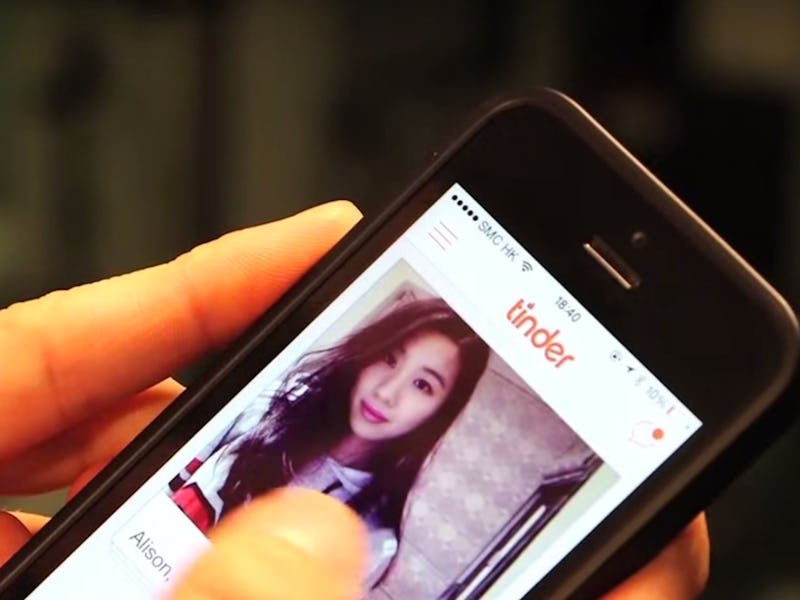Tweaking Your Personality for Tinder Dates Back to the Early 20th Century
Your incessant profile shopping has a historical precedent, thanks to the Shopgirls.

Drafting your personal profile on an online dating service can be painstaking. It’s one thing if you’re looking for a quick hook-up: in that case, all you need is some hot pictures and the patience to sift. If an emotionally compatible mate is what you’re after, the image you project with your interests and pictures plays a major role. The burden of accurately conveying your personality through a dating profile is too immense, which is why online dating emphasizes selling a brand. Perhaps it’s easier if we can start by finding someone who likes the things we like.
In Moira Weigel’s upcoming book Labor of Love, (May 17, FSG Books) the second chapter is dedicated to the “likes” that drive the online dating experience. To illustrate her point — agreement or disagreement with our interests tends to make or break a date — she relates the common experience of becoming uninterested in someone you’ve hooked up with after that person directly offends your personal taste. A first date is going unbelievably well until your date starts waxing poetic about the artistic genius of Nickelback. And just like that, it’s all over.
While men, women, and everyone in between in the modern era base compatibility with a potential mate on shared interests, Moira’s insights primarily deal with the female perspective in dating dynamics. In the second chapter of her book, Moira provides historical context on the topic of curated personalities to shed light on the uncanny resemblance between online dating of the modern era and the dating tactics of “Shopgirls” in the early 20th century.
When women began to take jobs as Shopgirls in department stores in the 1920s, they started recognizing that what they learned at their jobs directly translated to their dating approaches. By observing male customers all day, Shopgirls learned to analyze the intricacies of taste to discern information about social status and class of men. They became very good at separating the successful, wealthy ones from the men who wouldn’t make desirable husbands. The same went for their female customers: by studying their female counterparts, the Shopgirls learned what it took to eventually be married to a wealthy man.
A woman on her phone scrolling through online dating profiles
Even if these Shopgirls came from poor backgrounds, they began to understand that an imitation of desirable qualities could nullify their backgrounds completely. The popularization of makeup, for example, perpetuated the “fake it till you make it” mentality as any woman could improve her appearance, and the launch of cheaper fashion brands allowed women to bolster that aesthetic. A made-up face and tasteful clothes demonstrated that a woman was dedicated to maintaining her femininity, a quality very desirable to the men they were after.
Whereas a woman’s “virtues” defined her character in previous decades, superficiality gave rise to the era of “personality.” A woman’s personality was a form of currency, something she could tweak and employ to win over men. Author Susanna Croft wrote a book called The Duty of Beauty, in which she emphasized beauty as a utility. “Beauty is no longer vanity, it is use,” she said. Previous cultural moments lauded a woman’s sincerity, what she did when no one was looking or the values that she held close to her heart. The age of personality chucked sincerity aside and affirmed the belief that all you had to do was look the part.
The cover of Moira Weigel's 'Labor of Love'
Chapter 2 of Weigel’s book demonstrates a society deeply rooted in the patriarchy: the prospect of getting married to a wealthy man, after all, is driving the behaviors of these Shopgirls. On the other hand, the discovery of personality exposes the power women were able to latch onto in the midst of societal subjugation to men. They began to uncover the power they wielded over men when they batted their eyelashes or smiled gently. Sex appeal became a woman’s most powerful tool.
Returning to the modern day landscape of online dating, personalities — what you like and dislike — continue to shape the experience of dating, perhaps more than ever before. While the Shopgirls of the 20th century at least had face-to-face opportunities to show off their carefully curated personalities, dating apps like OkCupid and Tinder leave it up to a few pictures and facts to tell an entire story. Keep in mind that people have gotten better at tweaking their personalities to accrue more potential mates as online dating has become more prevalent. Similarities between your brand and someone else’s is a great jumping off point, but as most of us know, that person whose musical interests were similar to ours on Tinder could perfectly well turn out to be a nightmare in real life. We probably won’t see online dating disappear anytime soon, but never underestimate the revealing nature of what Shopgirls shirked: sincerity.